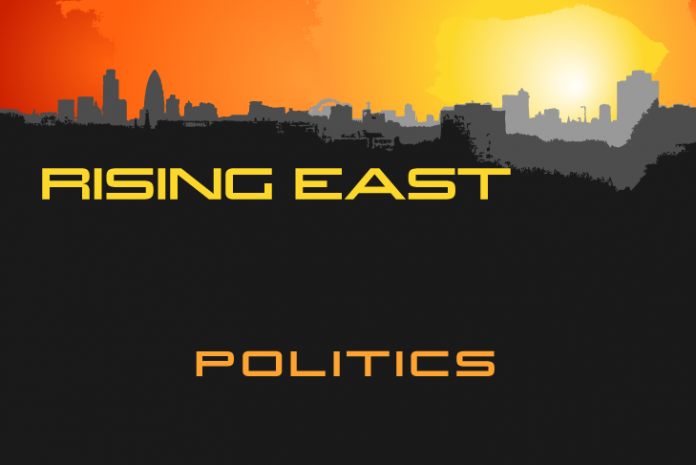As Israel’s general election falls on St Patrick’s Day, Ferdia Carr traces the connections between the two nations and the East End.
Today there’s a decent chance that East London’s pub landlords will be filling their coffers selling pints of Guinness to supporters of Israel’s Labour Party. As you may know, today is St Patrick’s Day; you may not know that it is also polling day in Israel, and there at least, the Labour Party is tipped to win.
Israel and St Patrick’s Day have something else in common, namely, a tendency to blow things out of proportion.
In the case of Paddy’s Day, Irish ancestry is grossly exaggerated. Across the Anglosphere, any and every one with a drop of O’Neill in them touches up their graying Irish roots for the day, no matter how far gone or convoluted the connection.
While he might not be playing up his claims to Irishness, the leader of Israel’s opposition Labour party (leading in the polls), Isaac Herzog, has a sturdier link to Ireland than most of the once a year plastic Paddies you’ll encounter on an East End pub crawl tonight.
Isaac’s father Chaim Herzog was after all Israel’s first and only Irish president, the J.F.K of Israel, if you like. Only Chaim actually grew up back in the old country. Born in west Belfast in 1918, his family moved to the Portobello district of Dublin, where he lived until the age of 17. He left for the Holy Land in 1935. Himself becoming Israel’s sixth president, he was a childhood friend of Ireland’s fifth president Cearbhall Ó’Dáilaigh, dedicating a statue to him years later.
Chaim’s father Yitzhak, after whom today’s Labour party leader was named, though not from Ireland originally, was deeply involved in the country. Before eventually becoming Chief Rabbi of Palestine, latterly Israel, Yitzhak HaLevi Herzog served as the first Chief Rabbi of Ireland after independence from Britain.
Known then as the ‘Sinn Fein’ Rabbi, owing to his support for said Irish Republican party and Ireland’s first secessionist parliament during the Irish war of independence, Rabbi Herzog was also a fluent Gaelic speaker – something most native Irish people can hardly lay claim to.
The ancestors of the Irish Republican movement that Yitzhak senior supported, both the Irish government and the dissident rebels that carried the militant flame to the modern Provisional IRA, lent their support to Palestinian nationalism rather than Zionism as time went by. Rabbi Herzog’s Dublin born son Chaim fought in the 1948 Arab-Israeli war, and was an ardent defender of Zionism throughout his career. Tearing up a U.N resolution equating Zionism to racism, he delivered an historic speech to the General Assembly, in his well-spoken South Dublin accent.
If today the ‘Sinn Fein’ Rabbi could walk down the streets of west Belfast, where he and his family lived, he would see Palestinian flags being flown by the political descendants of those Republicans he supported. On the stretch of Crumlin Road where Chaim Herzog was born, a British Loyalist area, he would likely see the flag of Israel being flown. A quirk of history more than anything, as Loyalists adopted the Israeli cause to show their antipathy towards their Republican foes and their support for the Palestinian cause.
In Ireland the average person on the street will express sympathy for Palestine, when asked about the conflict with Israel. A result of historical sympathy for the perceived downtrodden underdog. Those same sympathies were projected onto European Jews in the first half of the twentieth century, whose very plight has always been the primary justification for a Jewish state. The newly written Irish constitution in 1937 gave special protective status to European Jews, then fleeing persecution from Nazi Germany. Almost five thousand Jews lived in Ireland before the creation of Israel, where the Herzog family had by then already moved.
In many cases being the underdog was something the Irish and European Jews had in common. During East London’s famous ‘battle of Cable Street,’ when an anti-fascist alliance turned back Oswald Mosley’s fascist black shirt movement, most of the immigrants were Irish and Jewish. In a few cases both. Maurice Levitas and his brother Max, communist activists, grew up a few streets away from the Herzogs in Dublin, and took part in the battle, the latter staying on to be a Stepney councillor for fifteen years.
The frosty relationship between Ireland and Israel today is the result of politics and history between two governments, but that relationship belies the relationship between Jewishness and Irishness, and in the case of the Herzogs, being Irish and being Israeli. The slowly declining Jewish community in Dublin, which Labour leader Isaac Herzog’s father and grandfather left behind, is a not-so-old testament to the tangible connection between Ireland and the Holy Land.
It’s a connection most wouldn’t think to look for. But when the stars align and Israel holds an election on St Patrick’s Day, it seems fitting enough that the next prime minister might just be the son of an Irish immigrant. To use two of the western world’s ubiquitous toasts: Sláinte and L’Chaim.
Ferdia Carr is Rising East‘s International Politics Editor.

